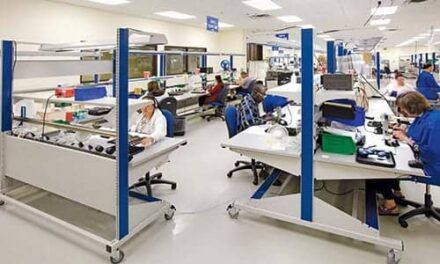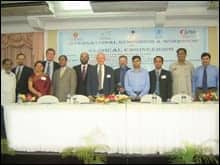 |
ORBIS, a nonprofit humanitarian organization, and the American College of Clinical Engineering (ACCE) collaborated to help jump-start clinical engineering in Bangladesh by organizing the country’s first International Symposium and Workshop on Clinical Engineering. The two organizations worked with the Bangladesh Ministry of Health and Family Welfare, the World Health Organization (WHO), and the Commission for the Advancement of Healthcare Technology Management in Asia (CAHTMA) on the event, which took place March 12 to 15, and consisted of a 1-day symposium followed by a 3-day workshop.
The workshop faculty included Nick Noyes, Arif Subhan, and Robyn Frick from the ACCE; Andrei Issakov from WHO; Azman Hamid from CAHTMA; and Ismael Cordero of ORBIS. It took many months of weekly teleconference calls across many time zones, coordination, and preparation under the leadership of Noyes, and expert guidance from ACCE’s international workshop coordinators Tobey Clark and Frank Painter to develop a workshop curriculum tailored to the unique needs of the host participants and the particular challenges in Bangladesh.
Officially the People’s Republic of Bangladesh, the South Asian country counts India, Myanmar, and the Bay of Bengal as neighbors. It is one of the world’s poorest countries, with more than one third of its 144 million people living below the poverty line. The country’s annual foreign debt repayments are nearly twice the amount of its health budget. Given this situation, it is no surprise that there is a serious lack of resources available for public health. The reasons are many, but the most significant are the lack of government policies for planning and supporting health care technology, and the lack of a clinical engineering professional force to help lead this process.
Shedding Light on the Problems
A day after arriving in Bangladesh, the workshop faculty, along with representatives from ORBIS Bangladesh, visited two health facilities in the capital city of Dhaka to gain a better understanding of the country’s health care technology challenges, and to further focus the content of the workshop.
The first facility visited was the Bangladesh Institute of Research and Rehabilitation in Diabetes, Endocrine and Metabolic Disorders (BIRDEM), a multifaceted health care delivery center founded in 1980. It is the largest health complex in Bangladesh, containing almost all types of clinical and diagnostic facilities. During the visit, the faculty soon discovered that the clinical engineering department at BIRDEM is perhaps the most advanced in Bangladesh. It houses the central institute of the Diabetic Association of Bangladesh, accommodated in three large multistoried buildings, wherein a modern, sophisticated cardiac center has also been established. The hospital, located in a 15-story building, now has 542 beds. Approximately 80 beds are available to poor, diabetic patients free of charge. On average, about 25,00 diabetic patients come and have checkups every day.
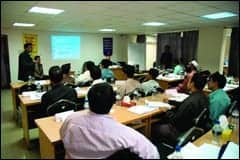 |
| Workshop participant presenting his group project. |
Next, the faculty visited the headquarters of the National Electro Medical Equipment Maintenance Workshop & Training Center (NEMEMW). Established in 1987, with funding and technical assistance from WHO, this center operates under the authority of the Ministry of Health and Family Welfare. Prior to the establishment of this center, no facility in the public sector existed for the maintenance of health care equipment in Bangladesh. Over the years, the center has been somewhat ignored, without any resources allocated for updating its facilities and tools, for hiring new personnel, or for training personnel in the maintenance of modern, sophisticated medical devices. As a result, the center can only provide simple maintenance to very basic devices, and many of its clients—public hospitals—feel they receive substandard service from NEMEMW.
Focused on Growth
Preceding the workshop, more than 100 participants—including a panel of foreign faculty, university professors, doctors, hospital directors, engineers, and technicians—participated in the 1-day symposium, which received local newspaper and TV coverage.
MG (rtd) AS M Matiur Rahman, honorable adviser, Ministry of Health and Family Welfare, attended the inaugural ceremony of the symposium and served as the chief guest. Other special guests included Prof Syed Maruf Ali, director, National Institute of Ophthalmology; Prof Rabiul Husain, chair of the IAPB South East Asia region; and Duangvadee Sungkhobol, country representative of WHO Bangladesh. Abu Raihan, country director, ORBIS International, Bangladesh country office, chaired the inaugural session Local presenters at the symposium included representatives from the electrical and electronics engineering department of the Islamic University of Technology, the NEMEMW, and Alcon.
In the symposium’s inaugural speech, Rahman said, “Modern health care is heavily dependent on sophisticated technology, but we don’t have a sufficient number of qualified personnel to support this. ORBIS International has taken the initiative to address the issue, and I greatly appreciate it.”
“Thirty percent of the medical equipment in Bangladesh is nonfunctioning,” Raihan said, based on a survey conducted by ORBIS Bangladesh. “The reasons are not only normal physical failure, but also due to behavioral and cultural practices. ORBIS Bangladesh is committed to the improvement of this discipline and very much would like to work with government and other partners in identifying and addressing the problems.”
“Clinical engineering is an important issue, and this is the time to take the issue seriously, plan for some regular courses, and develop a cadre of human resources under some standard training facilities,” Ali said.
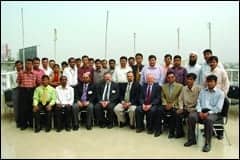 |
| Workshop faculty and participants. |
Husain also emphasized the importance of this issue, saying, “Sophisticated instruments in health care are being used without proper maintenance, and for that we need skilled manpower.”
In her speech, Sungkhobol emphasized that the “development of modern techniques and technological upgrades in this particular field have become intrinsic components of clinical medicine, and I feel this symposium and workshop is a very well-timed event to discuss and orient the concerned people on clinical engineering.” She offered all possible support of WHO toward the development of this discipline in Bangladesh.
Take Action
Thirty engineers, technicians, and other health care personnel attended the 3-day clinical engineering workshop. The faculty for the workshop included Noyes, Subhan, Frick, Issakov, Hamid, and Cordero, who shared practical knowledge with the participants in lectures, handouts, and group projects.
Similar to other workshops conducted worldwide by ACCE and WHO, the class focused on practical guidance for developing equipment control programs, budgeting, managing service contracts, developing safety programs, and managing human resources. The faculty challenged the participants to apply the learned concepts to solve problem scenarios, and then present their solutions to the other attendees. By the end of the 3 days, the participants founded the first Biomedical and Clinical Engineering Society of Bangladesh. To honor its formation, the faculty made a financial donation to kick off the society’s treasury.
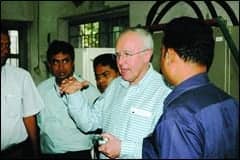 |
| Nick Noyes talking to BIRDEM engineers. |
As a culmination, the faculty and participants drafted an action plan for the country that included the establishment of a health care technology management committee for the country. The committee will:
- Design and execute a situational analysis of a health care technology management program for the public hospitals.
- Design a health care technology management system for public hospitals based on the results of the situational analysis. The system will adapt successful programs in other countries to the specific needs and conditions of Bangladesh.
- Develop university and technical school curricula for biomedical equipment technicians and clinical engineers.
- Implement a health care technology management library.
The group accomplished its final objective—the development of a clinical engineering/biomedical engineering society of Bangladesh —on March 15, during the clinical engineering workshop.
“Events like this are a huge opportunity to remember where we started, how we dealt with the early problems in our profession, and to learn how to articulate those memories in a way that leads to positive results,” Frick said. “The rewards are staggering—think of it—to be part of a fundamental improvement of health care technology for an entire country, in such a short time!”
“I feel that the ‘nuts-and-bolts’ focus of the workshop was exactly on target for Bangladesh, and that we accomplished a great deal in a very short time,” Noyes said. “The Bangladesh engineers, technicians, and health care professionals attending the workshop were primed for this type of training, and it was obvious that they valued what we were offering, in content, and in the action plans presented for improving health care technology management in their country. I was especially proud to have participated in the founding of the charter Biomedical and Clinical Engineering Society of Bangladesh and feel honored to have worked with a faculty that offered such a breadth of experience and dedication to improving health care in this country.”
The event generated great enthusiasm among the concerned departments and ministries of Bangladesh. It also immediately stimulated the WHO Bangladesh office to work with the ministry of health in conducting an in-depth situation analysis of the health care technology management situation in Bangladesh.
“This workshop opened the eyes of all relevant departments and agencies working in the health sectors,” Raihan said. “Private universities are showing an interest to develop academic courses and offer training programs in this discipline.” He added that the investment in all areas has increased to support medical equipment procurement.
Both the participants and faculty walked away from this event with a sense of having laid a strong foundation for clinical engineering in Bangladesh. The faculty enjoyed sharing their expertise with a group of enthusiastic counterparts in a faraway but friendly land.
“The workshop was a wonderful experience,” Subhan said. “During the workshop, we noticed that the attendees were very courteous and respectful of the faculty and appreciated and respected our expertise and knowledge. Also, this workshop provided an occasion to bring admiration to the United States.”
“This was an opportunity for US clinical engineering professionals to give back by joining ACCE and other societies that work toward providing these training workshops in developing countries,” Frick said.
Ismael Cordero, CBET, is a health care technology specialist at ORBIS International, NY, and a member of the education committee at ACCE. Arif Subhan, MS, CCE, is a senior clinical engineer at Masterplan, chair of the education committee at ACCE, and writes 24×7’s “CCE Prep” column. For more information, contact .





